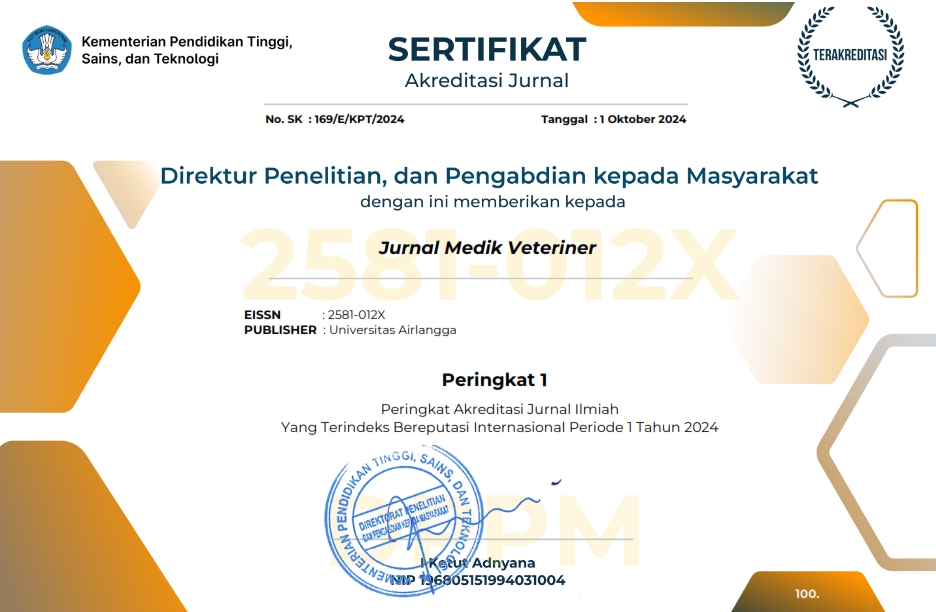Lime Peel Liquid (Citrus aurantifolia, Swingle) Inhibit Escherichia Coli In Vitro
Downloads
The purpose of this study was to determine in vitro inhibition test of lime peel liquid (Citrus aurantifolia, Swingle) against E. coli. The E. coli isolate was cultured on Muller Hinton Agar (MHA) media. Antibacterial test in this study using diffusion method. Negative control (K-) using CMC-Na 0.1%. Positive control (K+) using oxytetracycline antibiotics. The treatments were given lime peel liquid (Citrus aurantifolia, Swingle) with concentrations of 100%, 75%, 50% and 25%, respectively. The study design using Completely Randomized Design (CRD) method, with six treatments and four repetitions. Data were analyzed by Kruskal-Wallis test, Moreover, the Post Hoc Mann-Whitney method. The inhibition zone analysis results were showed that K + had significant differences compared to all treatments K-, 100%, 75%, 50%, and 25%. K- was found to be significantly different from treatments 100%, 75%, 50% and 25%. The results showed that the lime peel liquid has the potential as an antibacterial activity against the growth of E. coli in vitro. Concentration of 25% has shown the presence of inhibitory zones on Mueller Hinton media that have been inoculated with lime peel liquid.
Adnan, J. (2017). Formulasi gel ekstrak daun beluntas (PluceaindicaLess) dengan Na-CMC sebagai basis gel. Journal of Pharmaceutical Science and Herbal Technology, 1(1), 41-44.
Bhaskara, I. B. M., Budiasa, K., & Tono, K. (2012). Uji kepekaan Escherichia coli sebagai penyebab kolibasilosis pada babi muda terhadap antibiotika oksitetrasiklin, streptomisin, kanamisin, dan gentamisin. Indonesia Medicus Veterinus, 1(2), 186-201.
Bhalerao, A. K. D., Gupta, R. P., & Kumari, M. A. M. T. A. (2013). Pathological studies on natural cases of avian colibacillosis in Haryana state. Haryana Veterinary, 52, 118-120.
Boro, S. K., Pathak, D. C., Saikia, G. K., & Buragohain, M. (2018). Prevalence of Colibacillosis in birds in and around Guwahati city (Assam). Journal of Entomology and Zoology Studies, 6(1), 1000-1003.
Cetin, H. (2011). Evaluation of Antimicrobial Phenolic Compounds Agains FoodBorne Phatogen,. University of Kentucky.
Cushnie, T. T., & Lamb, A. J. (2005). Antimicrobial activity of flavonoids. International Journal of Antimicrobial Agents, 26(5), 343-356.
Dwi, W. K., Tyasningsih, W., Praja, R. N., Hamid, I. S., Sarudji, S., & Purnama, M. T. E. (2018). Deteksi Antibodi Brucella pada Sapi Perah di Kecamatan Purwoharjo Kabupaten Banyuwangi dengan Metode Rose Bengal Test (RBT). Jurnal Medik Veteriner, 1(3), 142-147.
Fatisa, Y. (2013). Daya Antibakteri Ekstrak Kulit Dan Biji Buah Pulasan (Nephelium Mutabile) Terhadap Staphylococcus Aureus Dan Escherichia Coli Secara in Vitro. Jurnal Peternakan, 10(1), 12-14.
Fernandez, S. P., Wasowski, C., Loscalzo, L. M., Granger, R. E., Johnston, G. A., Paladini, A. C., & Marder, M. (2006). Central nervous system depressant action of flavonoid glycosides. European Journal of Pharmacology, 539(3), 168-176.
Fikri, F., Purnama, M. T. E., Saputro, A. L., & Hamid, I. S. (2018). Identifikasi Escherichia coli dan Salmonella spp pada Karkas Sapi di Rumah Potong Hewan di Banyuwangi dan Resistensi Terhadap Antibiotika. Jurnal Sain Veteriner, 36(1), 123-128.
Fikri, F., Rahmaningtyas, I. H., Prastiya, R. A., & Purnama, M. T. E. (2019). Aktivitas Antibakteri Ekstrak Daun Sirsak (Annona muricata L.) Terhadap Pertumbuhan Bakteri Pseudomonas aeruginosa Secara In Vitro. Jurnal Veteriner, 20(3), 384-389.
Fikri, F., & Purnama, M. T. E. (2020). Pharmacology and phytochemistry overview on Sauropus Androgynous. Systematic Reviews in Pharmacy, 11(6), 124-128.
Fitri, L. (2010). Kemampuan daya hambat beberapa macam sabun antiseptik terhadap pertumbuhan Staphylococcus aureus dan Escherichia coli. Jurnal Biologi Edukasi, 2(2), 33-39.
Hamid, I. S., Ekowati, J., & Purnama, M. T. E. (2019). Kaempferia galanga L. Inhibiting Effect on Vascular Endothelial Growth Factor (VEGF) and Cyclooxygenase-2 (Cox-2) Expression on Endothelium of Chorioallantoic Membrane. Indian Veterinary Journal, 96(09), 80-82.
Jagessar, R. C., Mohamed, A., & Gomes, G. (2008). An Evaluation of the Antibacterial and Antifungi Activity of Leaf Extracts of Momordica charantina Against Candida albicans, Staphylococcus aureus and Escherichia coli. Nature and science.
Kartikasari, A. M., Hamid, I. S., Purnama, M. T. E., Damayanti, R., Fikri, F., & Praja, R. N. (2019). Isolasi dan identifikasi bakteri Escherichia coli kontaminan pada daging ayam broiler di rumah potong ayam Kabupaten Lamongan. Jurnal Medik Veteriner, 2(1), 66-71.
Luppi, A. (2017). Swine enteric colibacillosis: diagnosis, therapy and antimicrobial resistance. Porcine health management, 3(1), 16.
Musa, Y. M. (2014). Pengaruh Pengemasan Terhadap Escherichia coli dan Kapang Tepung Cangkang Kijing Lokal (Pilsbryoconcha sp.) Selama Penyimpanan Suhu Kamar (Doctoral dissertation, Universitas Negeri Gorontalo).
Mustarichie, R., Udin, Z., Levita, J., Musfiroh, I., & Zulfricar, I. (2011). Activity of Leaf Extracts of Coix lachryma Linn. and Asparagus Cochinchinensis Linn. as Breast Anticancer Drugs. Medical and Health Science Journal, 9(5), 47-57.
Nadi, M. S., Fikri, F., & Purnama, M. T. E. (2020). Determination of Capsaicin Levels in Capsicum annum Linn Ethanolic Extract using Thin Layer Chromatography Analysis. Drugs, 70(14), 1831-1842.
Owusu-Asiedu, A., Nyachoti, C. M., Baidoo, S. K., Marquardt, R. R., & Yang, X. (2003). Response of early-weaned pigs to an enterotoxigenic Escherichia coli (K88) challenge when fed diets containing spray-dried porcine plasma or pea protein isolate plus egg yolk antibody. Journal Animal Science, 81, 1781-1789.
Pathan, K. R., Gali, P. R., Pathan, P., Gowtham, T., & Pasupuleti, S. (2012). In vitro antimicrobial activity of Citrus aurantifolia and its phytochemical screening. Asian Pacific Journal of Tropical Disease, 2, S328-S331.
Pradika, A. Y., Chusniati, S., Purnama, M. T. E., Effendi, M. H., Yudhana, A., & Wibawati, P. A. (2019). Uji Total Escherichia coli pada Susu Sapi Segar di Koperasi Peternak Sapi Perah (KPSP) Karyo Ngremboko Kecamatan Purwoharjo Kabupaten Banyuwangi. Jurnal Medik Veteriner, 2(1), 1-6.
Prameswari, R. A., Sarudji, S., Praja, R.N., Tyasningsih, W., Yunita, M. N., & Yudhana, A. (2019). Deteksi Residu Antibiotik Oksitetrasiklin pada Susu Kambing Peranakan Etawah di Kelurahan Kalipuro, Banyuwangi dengan Uji Bioassay. Jurnal Medik Veteriner, 2(2), 112-118.
Ramadhinta, T. M., Nahzi, M. Y. I., & Budiarti, L. Y. (2016). Uji efektivitas antibakteri air perasan jeruk nipis (Citrus aurantifolia) sebagai bahan irigasi saluran akar alami terhadap pertumbuhan Enterococcus faecalis in vitro. Dentino, 1(2), 17-21.
Salni, & Marisa, M. R. W. (2011). Isolasi Senyawa Antibakteri dari Daun Jengkol (Pithecolobium lobatum Benth) dan Penentuan Nilai KHM-nya. Jurnal Penelitian Sains, 14(1), 38-41.
Saputro, A. L., Prastya, R. A., & Purnama, M. T. E. (2020). Aluminosilicates Decrease Cytochrome-C and Caspase-3 Expression in Mice Uterine Glands Model Zearalenone Intoxication. Indian Veterinary Journal, 97(02), 30-32.
Shekhar, S., Ranjan, R., Singh, C. V., & Kumar, P. (2017). Prevalence, Clinicohaemato-Biochemical alterations in colibacillosis in neonatal calves. International Journal of Current Microbiology and Applied Sciences, 6(9), 3192-3198.
Sucita, R. E., Hamid, I. S., Fikri, F., & Purnama, M. T. E. (2019). Ekstrak Etanol Kayu Secang (Caesalpinia sappan L.) Secara Topikal Efektif pada Kepadatan Kolagen Masa Penyembuhan Luka Insisi Tikus Putih. Jurnal Medik Veteriner, 2(2), 119-126.
Triana, N. M., Wilujeng, E., Putri, M. W. H., Yuda, D. M. P., Hardiono, A. L., Purnama, M. T. E., & Fikri, F. (2020). Antiproliferation effects of Glycine max Linn ethanolic extract on induced mammary gland carcinoma in albino rats. In IOP Conference Series: Earth and Environmental Science, 441(1), 012103.
Trombetta, D., Castelli, f., Sarpietro, M.G., Venuti, V., Cristani, M., Daniele, C., & Bisignano, G. (2005). Mechanisms of antibacterial action of three monoterpenes. Antimicrobial Agents and Chemotherapy, 49(6), 2474-2478.
Wibisono, F. J. (2015). Potensi Escherichia Coli sebagai" Foodborne Zoonotic Disease". VITEK: Bidang Kedokteran Hewan, 5, 55-61.
Wijayanti, A. D., Hakim, L., Widiyono, I., & Irianti, T. (2010). Penentuan Efektifitas Oksitetrasiklin Melalui Parameter Farmakokinetik atau farmakodinamik pada Plasma dan Jaringan Ayam Broiler. Jurnal Veteriner, 11(2), 14-15.
Wong, M. L. (2017). Uji aktivitas antibakteri minyak atsiri kulit buah jeruk nipis (Citrus aurantifolia Swingle) terhadap Streptococcus pyogenes (Doctoral dissertation, Widya Mandala Chatolic University Surabaya).
Authors who publish in this journal agree to the following terms:
1. The journal allows the author to hold the copyright of the article without restrictions;
2. The journal allows the author(s) to retain publishing rights without restrictions;
3. The legal formal aspect of journal publication accessibility refers to Creative Commons Attribution-NonCommercial-ShareAlike 4.0 International License (CC BY-NC-SA).






11.jpg)




















